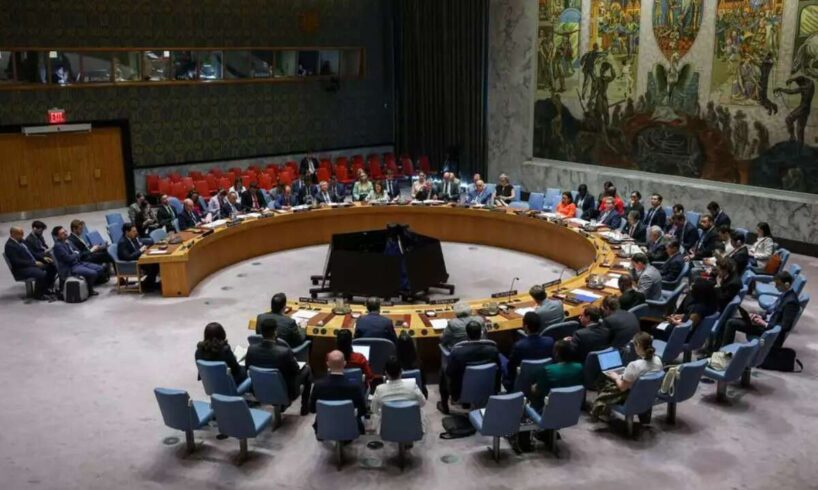
The UN Security Council voted Friday on a last-minute proposal from Russia and China to block the activation of the “snapback” sanctions mechanism against Iran. As with a similar attempt last week, the initiative failed, making it almost certain that international sanctions will be reimposed on Iran – a step that could pave the way toward another confrontation, possibly even military.
The Russian-Chinese draft had sought to delay the reimposition of sanctions for six months, until April 18, 2026, in order to allow more time for diplomatic engagement with the European “E3” – France, Germany and Britain.
The measure failed to gain the nine votes needed for adoption, just as it did in last Thursday’s vote on Sept. 19, when only four countries – Russia, China, Algeria and Pakistan – supported extending the suspension of sanctions.
In recent days, intensive diplomatic efforts were made on the sidelines of the UN General Assembly to avoid the return of sanctions. On Wednesday, French President Emmanuel Macron met with Iranian President Masoud Pezeshkian and said that a deal was still possible but that “Iran only has a few hours left.”
French President Emmanuel Macron. Photo: Reuters
On Thursday, Iranian Foreign Minister Abbas Araghchi met with British Foreign Secretary Yvette Cooper to discuss the dispute. According to Tehran’s Foreign Ministry, Araghchi sharply criticized the stance of the European trio as “unjustified, illegal and irresponsible.”
A European diplomat told AFP that the E3 believed they had “done everything to move things forward,” but Iran did not show the necessary flexibility. The Europeans demanded three steps from Iran: a resumption of International Atomic Energy Agency inspections, renewed nuclear talks with the US on a new agreement, and updated transparency regarding Iran’s stockpile of highly enriched uranium.
Ahead of the vote, Araghchi wrote on X that “This afternoon, the UN Security Council will be voting on a draft resolution to extend Resolution 2231. It is a fleeting opportunity for the Council to say ‘No’ to confrontation and ‘Yes’ to cooperation, providing time and space for diplomacy. In past days and weeks, Iran has put forward multiple proposals to keep the window for diplomacy open. The E3 has failed to reciprocate while the U.S. has doubled down on its dictates. In the face of this apparent E3-U.S. policy of escalation, Iran urges Council members to act responsibly and stand on the right side of history by supporting diplomacy, justice and international law. Might must never be right.”
With the proposal’s expected failure, the sanctions will automatically snap back into place at 3 a.m. local time (midnight GMT). These include a complete ban on uranium enrichment, an arms embargo, restrictions on ballistic missile development, asset freezes, travel bans, prohibitions on nuclear technology, and an obligation on all UN member states to enforce them by inspecting Iranian ships and aircraft.
The “snapback” mechanism was built into the 2015 nuclear deal to allow signatories to reinstate sanctions if Iran violated the agreement. The system avoids a Russian or Chinese veto by reversing the vote: instead of deciding whether to impose new sanctions, the Council must vote to continue suspending existing ones. If no consensus is reached within 30 days, the sanctions return automatically.
Russia and China have already voiced doubts about the legality of triggering the snapback under current conditions, given that the US unilaterally withdrew from the deal in 2018. Their objections raise questions about whether they will enforce the sanctions.
Danny Citrinowicz, a researcher at the Institute for National Security Studies and a former head of the Iran branch in Israel’s Military Intelligence, said the gravest consequence of renewed sanctions is the increased likelihood of a military clash. “This decision narrows the chances of returning to a nuclear agreement and even pushes us closer to the possibility of another confrontation between Israel and Iran – and potentially also the US – if there is no deal and Iran presses ahead with its nuclear program,” he said.
A ballistic missile is launched during an Iranian military exercise. Photo: AP AP
According to Citrinowicz, “this undermines Europe’s ability to influence the nuclear reality and effectively transfers control to the US, since this is the use of real leverage.” He added that the decision will “strengthen the conservatives in Iran, those who argue there is no point in negotiations.”
Economically, he said, the sanctions would “deal a serious blow to Iran’s economy, though not lead to its collapse. Iran will not surrender because of the snapback. But as we already see with the sharp decline in the exchange rate of the Iranian currency, the impact is significant.” He noted that contacts are still being made between Washington and Tehran, but Friday’s events “certainly do not bring a deal any closer.”





